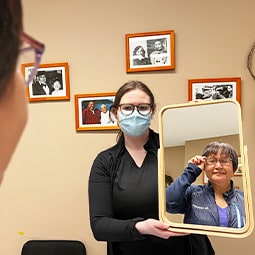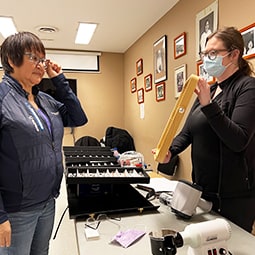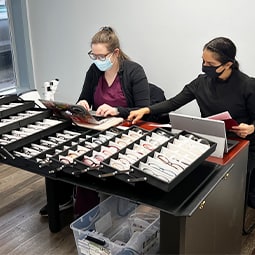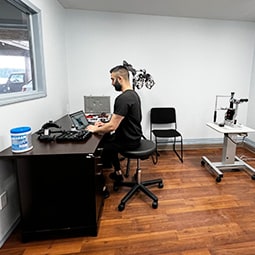Early Diagnosis Can Save Your Vision
Comprehensive eye exams are an essential step to protecting your overall ocular health and preventing vision loss. 75% of vision loss cases in Canada are preventable or treatable. Over 4.25 million Canadians live with a serious eye disease that can lead to impaired vision.
Even if you have perfect vision, you still need regular eye exams. Many vision-threatening eye diseases have no early symptoms but can be detected and diagnosed during a routine exam.
The leading causes of blindness in Canada are 4 eye diseases that can be treated and managed when detected and diagnosed early.
Cataracts
Cataracts develop when the clear, natural lenses of the eyes become cloudy. Anyone can develop cataracts, but they are most commonly associated with ageing and are mostly found in those over 60.
Symptoms of Cataracts
- Blurry or foggy vision
- Decreased night vision
- Halos around lights
- Dull or muted colours
- Filmy eyes that don’t clear when blinking
- Bright or glaring sunlight
Cataract Treatment
The early stages of cataracts can be managed with prescription glasses. When cataracts progress, they can interfere in daily activities, making driving, reading, or watching TV challenging. At this point, you may require cataract surgery.
Cataract Prevention
There’s no sure-fire way to prevent cataracts. But, you can slow them by adopting healthy lifestyle habits, like wearing sunglasses with proper UV protection and eating a diet rich in antioxidants.
Age-Related Macular Degeneration
Most commonly related to the ageing process, age-related macular degeneration (AMD) occurs when the macula deteriorates over time.
The macula is at the very centre of the retina and is responsible for our central vision. AMD affects this central vision while leaving peripheral vision clear. AMD is also one of the leading causes of blindness in those over 55 in North America.
Symptoms of AMD
There are no symptoms during the earliest stages of AMD, but it can be detected during a comprehensive, in-home eye exam.
Once AMD has progressed, the most common first symptom is blurred central vision while performing detailed tasks, like reading. The blurred area may increase in size as time passes.
Symptoms of advanced AMD include:
- Straight lines look wavy or distorted
- Dark spots and a blank portion of central vision
Prevention of AMD
Maintaining a healthy lifestyle and adopting healthy habits is important in preventing the development of AMD. These include:
- Using sunglasses with proper UV protection
- Reducing your blood pressure
- Reducing your intake of fatty foods
- Not smoking
- Eating a diet high in antioxidants
- Undergoing regular comprehensive eye exams
We check for signs of AMD during every in-home eye exam. AMD can be detected even if you’re not experiencing symptoms.
Glaucoma
Glaucoma involves the degeneration of the optic nerve that results in irreversible vision loss and blindness. There are many types of glaucoma, but it’s most commonly associated with increased intraocular pressure.
Symptoms of Glaucoma
Most often, glaucoma progresses painlessly and without symptoms. Vision only becomes affected at later stages, when extensive damage has already occurred.
However, angle-closure glaucoma results in sudden and painful symptoms and is a medical emergency. Symptoms include:
- Nausea
- Eye pain
- Red eyes
- Blurred vision
- Halos around light
Prevention of Glaucoma
Early detection, diagnosis, and management are the best ways to prevent vision loss associated with glaucoma.
Glaucoma can be diagnosed during a comprehensive eye exam. We use a handheld tonometer, a gentle, minimally invasive tool, to perform initial glaucoma tests during every exam.
Diabetic Retinopathy
Diabetes is a disease that prevents your body from producing or using insulin. Insulin is a hormone produced by your pancreas that regulates glucose (sugar) in the blood. If your body is unable to regulate glucose, it can damage organs, blood vessels, and nerves.
Unmanaged diabetes can lead to an eye disease called diabetic retinopathy.
Because our eyes are fed by delicate blood vessels, excess blood sugar caused by diabetes can block these tiny vessels, leading to abnormal blood vessel growth and blood or fluid leakage into the retina.
Symptoms of Diabetic Retinopathy
Diabetic retinopathy has no symptoms during the early stages, but at the disease progresses, signs include:
- Loss of central vision
- Blurry vision
- Flashes of light in field of vision
- Inability to see colours
- Black spots or holes in vision
Prevention of Diabetic Retinopathy
The best prevention of diabetic retinopathy is managing your diabetes. Annual routine diabetic eye exams are also essential for early detection, diagnosis, disease management, and preventing future vision loss.
Comprehensive eye exams are also important tools for diagnosing diabetes.
We look for signs of diabetes and diabetic retinopathy during every in-home eye exam.
To provide the best protection for your ocular health and vision, please book your in-home eye exam today.
Our Eye Care Services
Gallery
Testimonials
Excellent service and care. Dr. Panesar has been working with my dad who is in his nineties and very hard of hearing, and he has really gone the extra mile with his care and in answering all my questions. Both my dad and I are very happy with his services.
Sanya
Thanks to the very helpful and kind staff from Outreach my elderly mother now is able to continue with her most precious pastime of reading books. She is unable to get out and about and bringing their service to her was way beyond just helpful.
Keith
It was so nice to find a mobile optometrist, our family has been looking for a Doctor to come visit our housebound grandmother. Dr.Jassal does a great job with his patients. He is very good with communication and explaining things thoroughly. I would highly suggest this service to anyone that needs a mobile optometrist. Thanks Dr.Jassal!


















